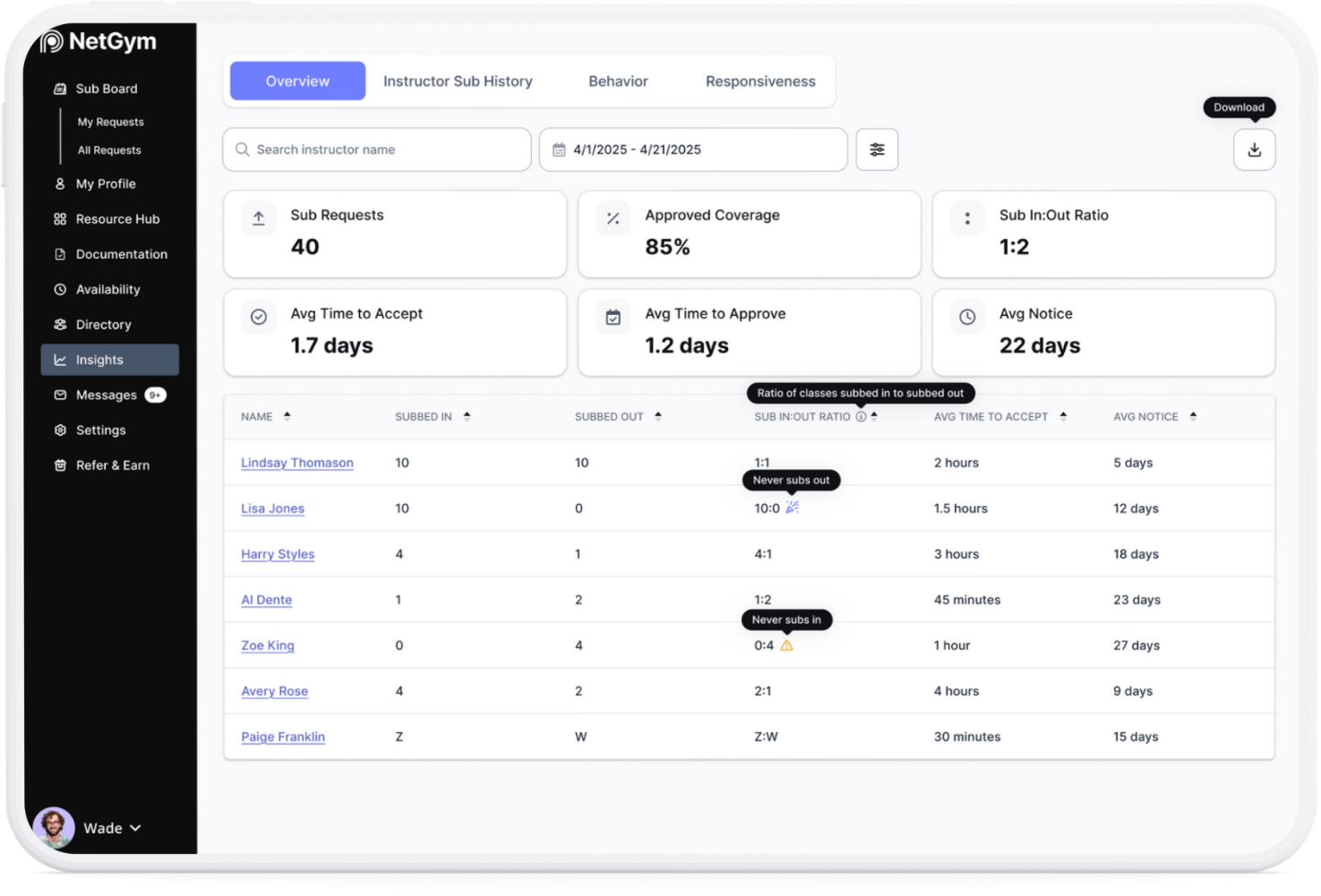- Blog
- >
- From Metrics to Meaning: How Sub In:Sub Out Rates Signal Potential Burnout
Last updated: December 26, 2025
From Metrics to Meaning: How Sub In:Sub Out Rates Signal Potential Burnout

Why Sub In:Sub Out Ratios Even Matter
At fitness studios and gyms, an instructor’s sub in:sub out rate (how often they cover classes vs. how often they give them up) can serve as an early indicator of well-being and engagement. A consistently low rate, where an instructor is giving away more classes than they’re picking up, may suggest:
- Distraction or disengagement: The instructor may be mentally checked out, even if they haven’t voiced it.
- Burnout risk: Gallup research shows burnout is strongly correlated with lower productivity, higher turnover, and diminished well-being. Frequent class give-aways could signal exhaustion or loss of motivation.
- Personal challenges: As Frances Frei emphasizes in her work on trust, people show up as their whole selves. When personal struggles go unspoken, they can quietly impact professional reliability.
Proactive support at this stage can make the difference between an instructor re-engaging or ultimately leaving the studio.

Already using NetGym? Make sure you know where to find sub in:sub out ratios in your dashboard.
Not yet on board? Join the 2,700+ studios and gyms automatically tracking instructor ratios to spot early signs of disengagement or burnout.
Best Practices for Intervention
1. Approach with Empathy and Curiosity
According to Harvard Business Review, leaders build stronger teams when they prioritize psychological safety, ensuring employees feel comfortable sharing concerns without fear of judgment.
Rather than assuming the worst, open with genuine curiosity: “I’ve noticed you’ve been subbing out more than usual, how are things going for you right now?”
This creates space for the instructor to share whether it’s scheduling conflict, stress, or something more serious.
2. Reinforce Trust and Support
Frances Frei’s framework highlights that trust rests on authenticity, logic, and empathy. To sustain trust in your intervention:
- Be transparent about why you’re bringing it up.
- Show empathy by listening fully.
- Offer concrete and objective data, like the instructor’s sub in:sub out ratio, to ground the conversation in facts, not feelings, and then provide logical, clear support options.
NetGym makes these insights easy to access, so managers can approach the discussion with clarity and fairness.
3. Address Burnout Proactively
Gallup’s research identifies unmanageable workload, lack of communication, and insufficient support as leading causes of burnout. Instructors often thrive on community energy, so isolation (less class coverage, fewer interactions) can compound stress. Consider:
- Adjusting schedules to align with peak energy times.
- Offering professional development (e.g., class format training, leadership opportunities).
- Providing wellness benefits like recovery sessions or counseling resources.
4. Create Pathways Back to Engagement
If the low sub in:sub out rate reflects waning motivation, discuss ways to reignite their purpose:
- Can they try a new format to re-spark creativity?
- Can they mentor a newer instructor to feel valued?
- Are there studio initiatives (events, community challenges) they’d like to lead?
Research from HBR shows that a sense of purpose is one of the strongest antidotes to disengagement.
The Takeaway
A low sub in:sub out rate is not just an operational headache—it’s a human signal. By approaching it with empathy, trust, and structured support, fitness leaders can protect against burnout, retain top talent, and strengthen community culture.
As Gallup notes, employees who feel supported are 62% less likely to experience burnout. And in the high-energy, people-first world of fitness, ensuring your instructors feel cared for isn’t just good leadership, it’s a competitive advantage.